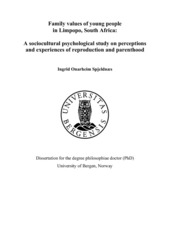Family values of young people in Limpopo, South Africa: A sociocultural psychological study on perceptions and experiences of reproduction and parenthood
Doctoral thesis
Permanent lenke
https://hdl.handle.net/1956/7757Utgivelsesdato
2013-12-12Metadata
Vis full innførselSamlinger
Sammendrag
Background: The institution of the family in South Africa is commonly described as being in a state of crisis, and young people’s family values are key in learning about how to break the negative trends in the institution of the family in the country (Holborn & Eddy, 2011). The aim of this thesis was to improve understanding of values related to reproduction and family life among young people in poverty-ridden communities in South Africa. Methods: The research problem was approached in a sociocultural psychological perspective. Family values were studied through attitudes towards having children and experiences of and expectations towards parenthood among adolescent men and women in the Limpopo Province. A mixed-methods approach comprising of three phases: 1) quantitative methods, 2) qualitative methods, and 3) mixing the two methods in an overall discussion of the findings, were used. In the quantitative phase, a cross-sectional design was used to measure attitudes towards reproduction in three generations of women (n=516). In the qualitative phase, a phenomenological design was used to explore how adolescent men and women (n=22) conceptualize parenthood. Results: The continuity and changes in attitudes towards reproduction through the three generations of women (Paper I) were better understood through knowledge about how young people conceptualized fatherhood (Paper II) and motherhood (Paper III). While motherhood was understood in terms of responsibility, single parenthood, and availability, fatherhood was understood in terms of irresponsibility, unavailability, and absence. The conceptualizations of fatherhood and motherhood in the young people indicated a desire to change from their parent generation, especially the young men. The young men and women expressed similar and compatible parenthood agendas were gender equality arises as a very central family value. 10 Conclusions: This thesis contributes to the debate about the family described as “being in a state of crisis” in South Africa by giving voice to disenfranchised young people in their transition to adulthood. Their urge for gender equality in the family certainly indicates a family institution in transition, which is an important input to future debates and policy making.
Består av
Paper I: Spjeldnaes, I.O., Sam, D.L., Moland, K.M., & Peltzer, K. (2007). Continuity and change in reproductive attitudes of teenage women, their mothers, and maternal grandmothers in South Africa. South African Journal of Psychology, 37(4):856-877. Full-text not available in BORA. The article is available here: http://dx.doi.org/10.1177/008124630703700412Paper II: Spjeldnaes, I.O., Moland, K.M., Harris, J., & Sam, D.L. (2011). Being man enough: Fatherhood experiences and expectations among teenage boys in South Africa. Fathering, 9 (1), 3-21. Full-text not available in BORA. The article is available here: http://dx.doi.org/10.3149/fth.0901.3
Paper III: Spjeldnaes, I.O., Moland, K.M., Harris, J., & Sam, D.L. (Accepted for publication) Responsible Mothering in Limpopo, South Africa: Perspectives of Adolescents. Psychology & Society. The article is available here: http://hdl.handle.net/1956/7758
